

Absolutdata.com. Social Media And The Big Data Explosion. The Big Data Impact on Social Media Marketing. The only secure password is the one you can’t remember. Let’s assume you log onto a bunch of different websites; Facebook, Gmail, eBay, PayPal probably some banking, maybe a few discussion forums and probably much, much more.

Do you always create unique passwords such that you never use the same one twice? Ever? Do your passwords always use different character types such as uppercase and lowercase letters, numbers and punctuation? Are they “strong”? If you can’t answer “yes” to both these questions, you’ve got yourself a problem. Let me help demonstrate the problem; I’ll show you what happens when you reuse or create weak passwords based on some real world examples which should really hit home. The tyranny of multiple accounts Think about it; how many accounts do you have out there on the internet? What happens is that people revert to patterns including family names, pets, hobbies and all sorts of natural, somewhat predictable criteria. Patterns and predictable words are bad, but what’s even worse is password reuse. Look familiar?
Very. Who’s who of bad password practices – banks, airlines and more. Ah, passwords.

Love ‘em or hate ‘em, they’re a necessary evil of the digital age. The reality is we all end up with an alphabet soup of passwords spread over dozens of various sites and services across the internet. Whilst we might not always practice it, we all know the theory of creating a good password; uniqueness, randomness and length. The more of each, the better. Of course we frequently don’t do this because of all sorts of human factors such as convenience, memory or simple unawareness of the risks. But what happens when the website won’t allow you to create a secure password? Even worse, what happens when our most “secure” institutions implement lazy password policies? Why bother?
Recently I went on a bit of a binge. So I coughed up a few dollars and got my hands on 1Password. All that was left was to go through each and every site where I had a password and replace the old one with a seriously secure version. No SSL The worst culprits are clearly forums. How about investment? Want to ditch your data scientists? Here are 7 startups that can help — Cloud Computing News. Big data: The quick and the dead — Cloud Computing News. A data mining, predictive analytics, and business intelligence community. Resources « CS 194-16: Introduction to Data Science. Why Klout is making its bed with Hadoop and … Microsoft — Cloud Computing News.
What IBM Does With Big Data. Why the Hoopla About Hadoop? Big Data Marketplaces Put a Price on Finding Patterns. Bundle Proves That Big Data Apps Aren’t Easy — Cloud Computing News. The Locker Project: Why Leave Data Tracking to Others? Do It Yourself. With companies looking to follow your data trail online, why not take possession of that information and find innovative uses for it yourself?
That’s the question Jeremie Miller — the developer known for building the open-source protocol that powers many Instant Messaging programs — is trying to answer. Miller is building The Locker Project, an open-source effort that allows users to capture and archive their own online “data exhaust,” the term used for the crumbs of data we leave behind as we move around the web. Using APIs and feeds, the Locker Project will pull in tweets, updates, pictures, check-ins, transactions, contacts and webpages, and will allow a user to store it on his or her own server or as part of a hosted service similar to the blog platform WordPress.
Miller’s company Sing.ly will provide the support for the open-source project. Readwriteweb has a good first look at the service. We’re still a ways off from something like this being mainstream, of course.